Out of the blue, head and tailing towards our boat was a school of rolling tarpon, meandering down to our position and oblivious to our presence. The fisherman stood on the casting deck on the front of the skiff trying not to allow his legs to shake as he frantically stripped off line and attempted to control it all the while keeping an eye on the approaching fish. As they came into range he began to whirl the 12 weight fly rod around his head, increasing the distance with every false cast before launching the large 4/0 Black Death fly at an intersecting angle. Pause. The fly is allowed to sink.
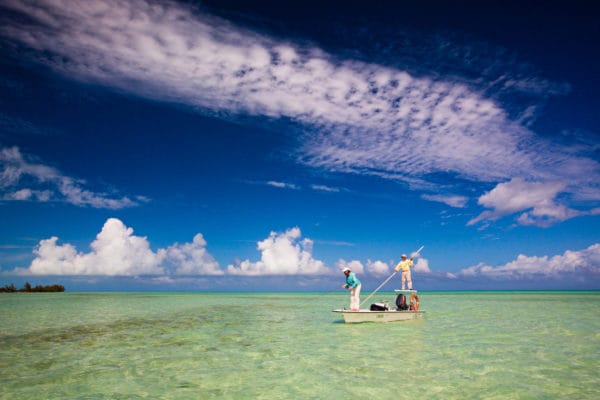 “Strip! Strip! Strip!” instructed the guide, “Fish is coming!” the front fish broke away charging forward in a burst of speed and rolling on the fly and engulfing it. The line went tight and the angler pointed the rod directly at the fish before strip striking with the line two or three times. The calm water erupted in an explosion of rattling fury and flashing silver. The tarpon jack knifed out of the water, rattling gill plates in defiance while doing a complete somersault and crashing back into the foam. The reel began to protest as the fish sped away in a blistering display of speed.
“Strip! Strip! Strip!” instructed the guide, “Fish is coming!” the front fish broke away charging forward in a burst of speed and rolling on the fly and engulfing it. The line went tight and the angler pointed the rod directly at the fish before strip striking with the line two or three times. The calm water erupted in an explosion of rattling fury and flashing silver. The tarpon jack knifed out of the water, rattling gill plates in defiance while doing a complete somersault and crashing back into the foam. The reel began to protest as the fish sped away in a blistering display of speed.
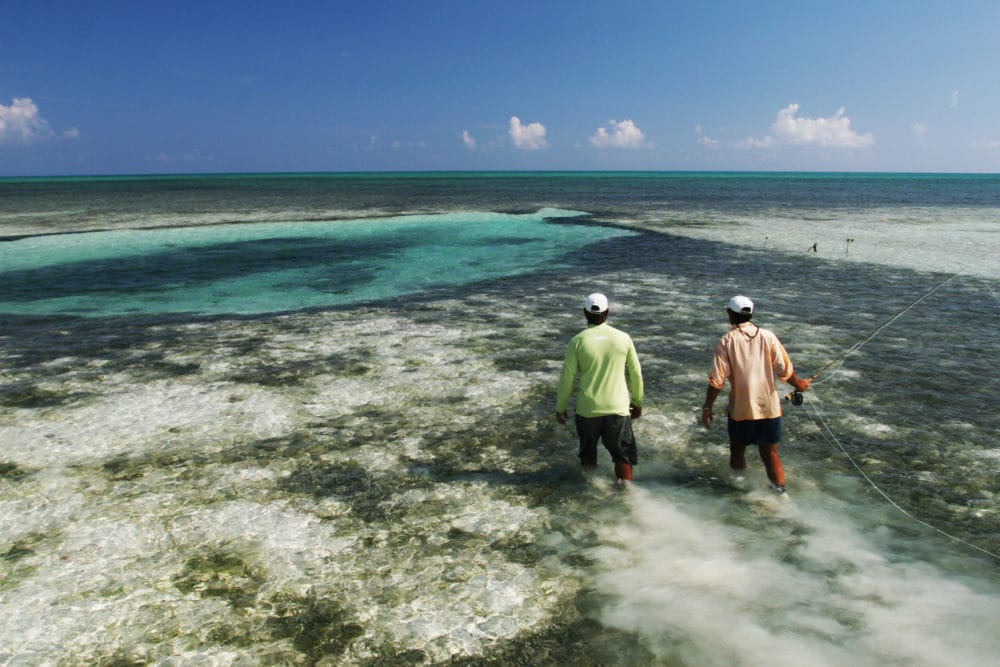 “Let him go, let him go!” instructed the guide… the angler cranked the rod over to one side and began to apply pressure to the fish. Again the tarpon launched itself thrashing out of the water in a series of acrobatics, the last of which dislodged the fly from its concrete bucket of a mouth. Another one down to the law of averages. They say you land one tarpon in every ten you hook, but that does not make you feel any better! The angler began to laugh in a slightly maniacal way that immediately indicated to me that his first battle with the silver king had resulted in another tarpon addict.
“Let him go, let him go!” instructed the guide… the angler cranked the rod over to one side and began to apply pressure to the fish. Again the tarpon launched itself thrashing out of the water in a series of acrobatics, the last of which dislodged the fly from its concrete bucket of a mouth. Another one down to the law of averages. They say you land one tarpon in every ten you hook, but that does not make you feel any better! The angler began to laugh in a slightly maniacal way that immediately indicated to me that his first battle with the silver king had resulted in another tarpon addict.
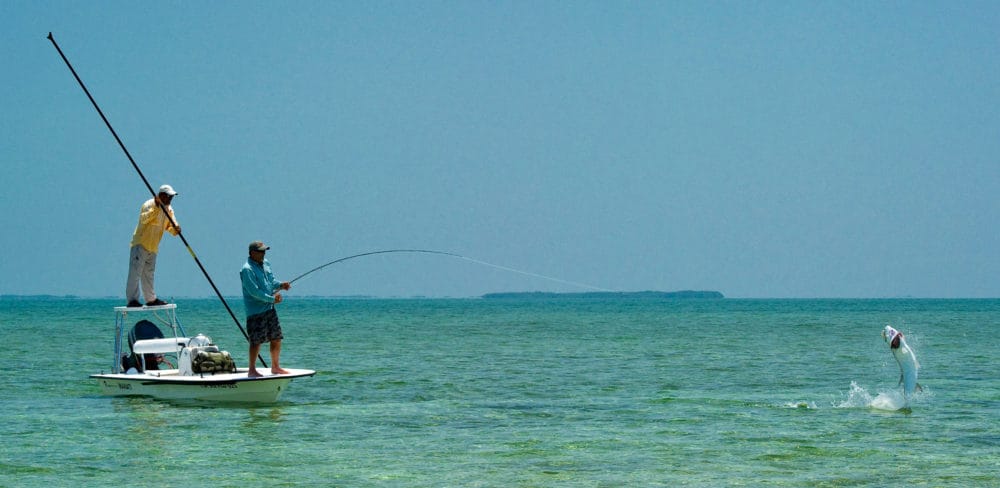 Megalops Atlanticus, known by some as Buttkickus Fishus, has a following all of its own. No matter whether it is 8 lbs or 80 lbs the first thing a tarpon does when hooked, is head for the sky and that is why they are so exciting. As one of the oldest fish swimming in the ocean, it hasn’t changed much in 60 million years. Tarpon still have a lung allowing them to breath air (hence why they roll) which can inject new life into them and prolong a fight extensively. Baby tarpon, up to 40 lbs or so, are huge fun on smaller line weight rods, but ocean going migratory tarpon, normally over 80 lbs, will give you the battle of a lifetime and test you to the limits.
Megalops Atlanticus, known by some as Buttkickus Fishus, has a following all of its own. No matter whether it is 8 lbs or 80 lbs the first thing a tarpon does when hooked, is head for the sky and that is why they are so exciting. As one of the oldest fish swimming in the ocean, it hasn’t changed much in 60 million years. Tarpon still have a lung allowing them to breath air (hence why they roll) which can inject new life into them and prolong a fight extensively. Baby tarpon, up to 40 lbs or so, are huge fun on smaller line weight rods, but ocean going migratory tarpon, normally over 80 lbs, will give you the battle of a lifetime and test you to the limits.
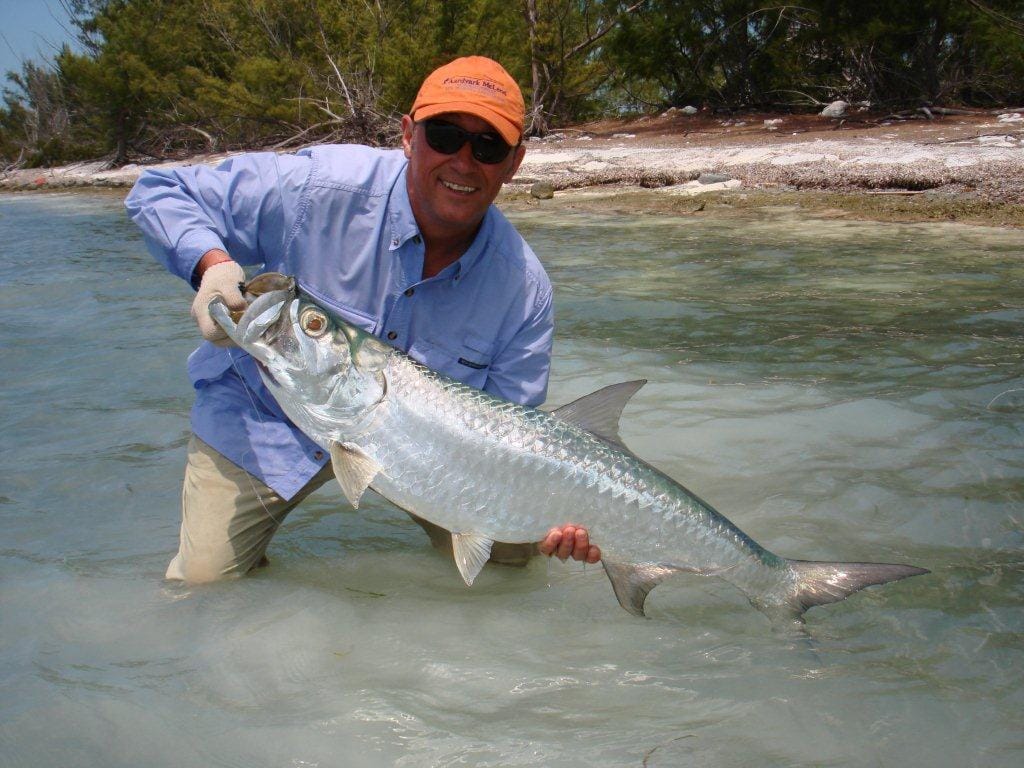 There are many areas around the Caribbean that have tarpon. However one of the only places that has consistent numbers of good sized fish without the flats looking like a regatta is Cuba. It offers a huge variety of environments in which to catch tarpon: from deep Atlantic channels to the endless, clear water flats that provide the perfect opportunity to sight fish for tarpon in shallow water. Here is a run down of our favourite operations:
There are many areas around the Caribbean that have tarpon. However one of the only places that has consistent numbers of good sized fish without the flats looking like a regatta is Cuba. It offers a huge variety of environments in which to catch tarpon: from deep Atlantic channels to the endless, clear water flats that provide the perfect opportunity to sight fish for tarpon in shallow water. Here is a run down of our favourite operations:
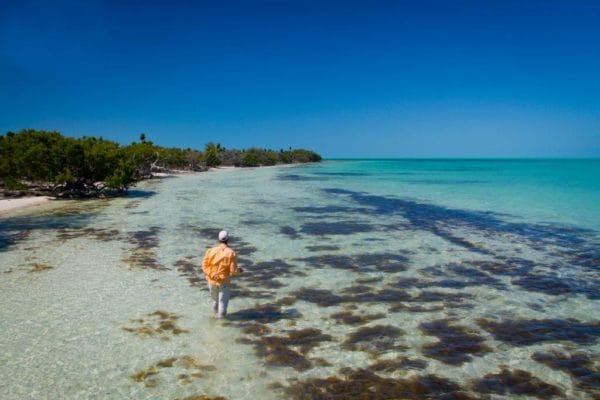 Cayo Largo, also on the south west coast in the Canarreos archipelago offers consistently good fishing with tarpon ever present and found primarily in the mangroves or reef ranging from 15 lbs to 30 lbs. Traditionally the migratory fish arrive from April to August and tarpon over 100 lbs have been landed. Winding through the flats and cays are deeper channels that provide perfect areas for tarpon to feed on the bountiful shoals of sardines but when the tides are right they move onto the flats providing great sport. Here you would be hotel based, staying at the all inclusive Sol Melia Hotel. The season runs from October to August with prime time in May and June.
Cayo Largo, also on the south west coast in the Canarreos archipelago offers consistently good fishing with tarpon ever present and found primarily in the mangroves or reef ranging from 15 lbs to 30 lbs. Traditionally the migratory fish arrive from April to August and tarpon over 100 lbs have been landed. Winding through the flats and cays are deeper channels that provide perfect areas for tarpon to feed on the bountiful shoals of sardines but when the tides are right they move onto the flats providing great sport. Here you would be hotel based, staying at the all inclusive Sol Melia Hotel. The season runs from October to August with prime time in May and June.
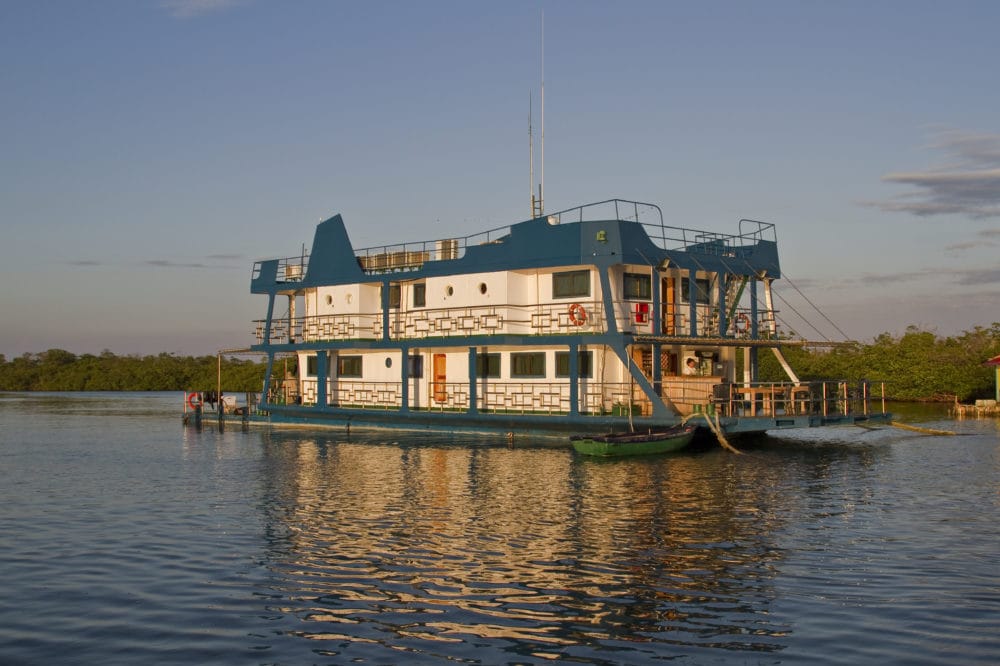 Jardines de la Reina on the southern coast is fished from the live-aboard boats La Tortuga (moored), Halcon, La Reina, Caballones and the luxury yacht, Avalon Fleet 1. The area is bisected by large channels, or “Bocas” that provide conduits from which the tarpon can move from the safety of deeper water up onto the flats. They are perfect for polling and give you the opportunity to cast at specific rolling fish. The season runs from October until August with baby tarpon up to 30 lbs present all year – mainly in the mangroves. Larger tarpon, up to and above 100 lbs, are seen on the flats from the end of March onwards and prime time is between March and June.
Jardines de la Reina on the southern coast is fished from the live-aboard boats La Tortuga (moored), Halcon, La Reina, Caballones and the luxury yacht, Avalon Fleet 1. The area is bisected by large channels, or “Bocas” that provide conduits from which the tarpon can move from the safety of deeper water up onto the flats. They are perfect for polling and give you the opportunity to cast at specific rolling fish. The season runs from October until August with baby tarpon up to 30 lbs present all year – mainly in the mangroves. Larger tarpon, up to and above 100 lbs, are seen on the flats from the end of March onwards and prime time is between March and June.
 Casa Batida Santa Maria is located on the north coast of Cuba at Jardines del Rey and UNESCO has declared this region a biosphere reserve. This stunning area of channels, mangroves and flats has world class tarpon fishing with fish from 10 lbs to 40 lbs present year round and migratory fish 80 lbs to 160 lbs showing up in great numbers from March onwards. Accommodation for fishermen is either in the nearby beachfront bungalows next to the fishing club, or the all-inclusive Sol Club Melia. The season runs from March to September with prime time April to July.
Casa Batida Santa Maria is located on the north coast of Cuba at Jardines del Rey and UNESCO has declared this region a biosphere reserve. This stunning area of channels, mangroves and flats has world class tarpon fishing with fish from 10 lbs to 40 lbs present year round and migratory fish 80 lbs to 160 lbs showing up in great numbers from March onwards. Accommodation for fishermen is either in the nearby beachfront bungalows next to the fishing club, or the all-inclusive Sol Club Melia. The season runs from March to September with prime time April to July.
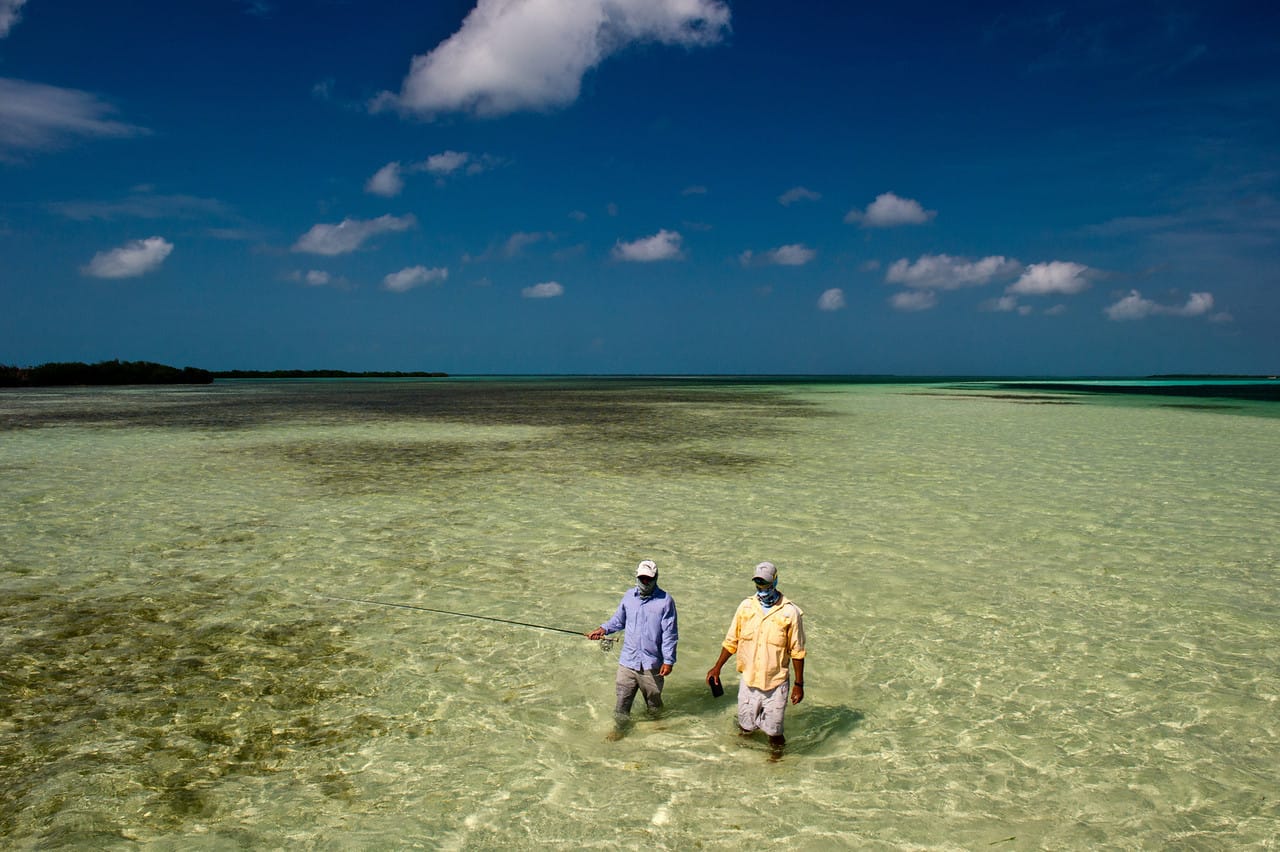 Isle of Youth (Isla de la Juventud) is on the south west coast and this remote Marine Park in the Canarreos Archipelago. The combination of marl, sand, and turtle grass provide a perfect environment for fishing from a skiff, enabling you to target tarpon as they come into the channels from deeper water. Tarpon here frequently tip the scales at 100 lbs but it is true to say that fishing here can be challenging. You can be based at the Hotel El Rancho or on the live-aboard, La Perola, which allows you to avoid the open water crossings from the mainland. La Perola is taken by an intact party and can accommodate up to six rods. The season runs from October until the end of July with prime time falling in May.
Isle of Youth (Isla de la Juventud) is on the south west coast and this remote Marine Park in the Canarreos Archipelago. The combination of marl, sand, and turtle grass provide a perfect environment for fishing from a skiff, enabling you to target tarpon as they come into the channels from deeper water. Tarpon here frequently tip the scales at 100 lbs but it is true to say that fishing here can be challenging. You can be based at the Hotel El Rancho or on the live-aboard, La Perola, which allows you to avoid the open water crossings from the mainland. La Perola is taken by an intact party and can accommodate up to six rods. The season runs from October until the end of July with prime time falling in May.
Unlike the Florida Keys all these huge protected areas are only fished by the operations based there and, as a result, there is less pressure on the fisheries. If travelling with non-fishers, Cayo Largo and Casa Batida Santa Maria have suitable accommodation and those of you with diving partners, Jardines de la Reina offers fantastic diving. Virgin, Iberia and Air France all have flights to Havana that work with the fishing schedules and although visas are required, we are able to issue them for you.
If you would like to get away this autumn for a saltwater break and would like more information please contact Peter McLeod or Alex Jardine call us on ++44 1980 847389. Alternatively click HERE if you would like us to contact you.
